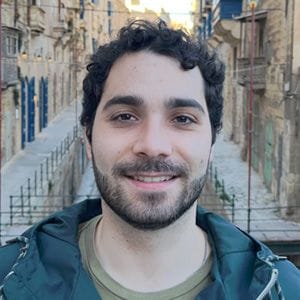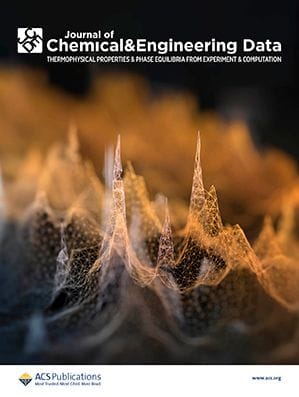Learn more about Pedro Velho in an exclusive interview and browse the 2025 winner's published research in ACS Journals.

The Journal of Chemical & Engineering Data (JCED) Early Career Award is presented annually to one outstanding early career scientist/engineer conducting experimental or computational research in thermophysical properties and phase equilibria. For the 2025 award year, we received a significant number of outstanding nominations. Thank you to everyone who submitted their nomination, and we hope you will again submit your nomination for a future award.
We are pleased to announce Pedro Velho as the winner of the 2025 Journal of Chemical & Engineering Data Early Career Award. Pedro Velho is a Ph.D. candidate in Thermodynamics at the Faculty of Engineering at the University of Porto (FEUP) in Portugal. Pedro obtained an Integrated B.S./M.S. degree in chemical engineering with a specialization in Processes and Products at FEUP, and part of his M.S. research leading to a thesis entitled “Development of a More Predictive CPA Equation of State” was carried out at the Technical University of Denmark. Pedro Velho’s research focuses on phase equilibria, equations of state, thermophysical properties, green novel solvents, and thermodynamic modeling of electrolyte-containing systems.
Pedro Velho will receive his award and present his current research in a webinar organized by ACS Publications and JCED on Monday, June 9 at 11:00 AM ET. Look out for more information on how to register for this webinar soon.

Read Our Interview with Pedro Velho
What inspired you to pursue this field of research?
From an early stage in my academic journey, I was fascinated by how thermodynamics provides a fundamental understanding of matter at a molecular level while maintaining a macroscopic perspective and real-world applicability. Moreover, during my M.Sc. studies, I had the opportunity to do some research on liquid-liquid equilibria (at FEUP, in Portugal) and on equations of state (at DTU, in Denmark), which sparked my interest in modelling phase equilibria and thermophysical properties.
What does winning this award mean to you?
Receiving the JCED Early Career Award is an incredible honour and a validation of the research I am passionate about. It is a recognition not only of my work but also of the one of my Students, Colleagues and Collaborators, who have contributed immensely to my journey. Obviously, this award reinforces my commitment to the field of Thermodynamics and inspires me to continue pushing the boundaries of knowledge. I hope it also serves as motivation for the next generation of researchers.
What advances are you hoping to see in your field in the next decade?
I hope to see significant advancements in the development of predictive thermodynamic models for the description of complex systems, particularly electrolyte-containing solutions, bio-based solvents and even the fascinating case of water. With the growing focus on sustainability, there is an increasing need for thermodynamic frameworks that can guide the design of greener and more efficient industrial processes, and the collaboration between computational and experimental researchers will be crucial in making these advancements become reality. Additionally, I expect that the integration of machine learning and artificial intelligence into thermodynamic modelling will lead to faster and more reliable predictions.
What advice would you give to young investigators who aspire to be where you are now?
First and foremost, stay curious and be open to exploring different aspects of your field. Thermodynamics is a vast area, and breakthroughs often come from interdisciplinary thinking and from applying relatively simple solutions to complex problems. Find mentors who can guide you, challenge you, and support your growth. Surround yourself with Colleagues who share your passion. Uphold strong ethical standards in research, and remain persistent, as scientific progress takes time. Lastly, take every opportunity to share your research through publications, conferences, and collaborations, and never underestimate the power of social networks in today’s world. Engaging with the broader scientific community will not only provide new perspectives but also open doors to future opportunities.
